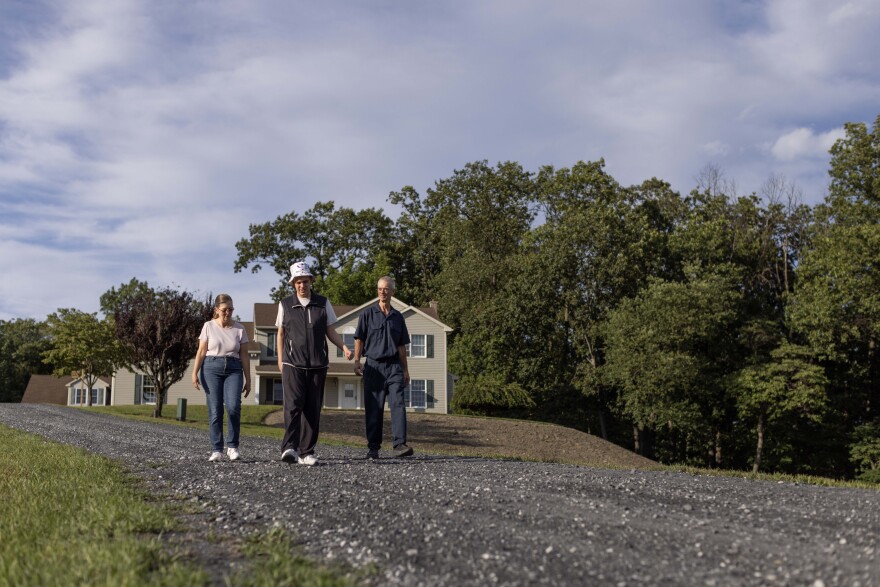NORTH WHITEHALL TWP., Pa. — A pair of local business owners have teamed up with a nonprofit public interest law firm to challenge township zoning laws they say have impeded their business.
Gene and Debbie Weierbach, who run a repair shop on their property in the township, have alleged township Supervisor Dennis Klusaritz weaponized the code to make officials investigate the Weierbachs’ decades-old business after a dispute over Klusaritz's vehicle repairs.
A release from the Institute for Justice states Gene Weierbach has run his shop in his garage on the secluded 16-acre property on which he lives with his wife and adult son with severe autism.
The release said they have had no neighbor or customer complaints for 24 years.
The statement said that in 2021, Klusaritz became a customer at the garage and brought in three vehicles to work on, including an old BMW with mechanical and wiring issues.
In 2023, the pair had a dispute over work on the BMW, with Klusaritz accusing Weierbach of incompetence and overcharging him, and Weierbacher telling Klusaritz to take his business elsewhere.
Not long after, Klusaritz allegedly asked the township to investigate the shop, which led to the issuing of a citation and cease-and-desist letter, stating the garage violated the zoning code, according to the release.
Variance denied
After receiving the documents, the Weierbachs hired an attorney and applied for a zoning variance.
During a meeting with North Whitehall Township Zoning Hearing Board, 16 people spoke in favor of the business and the board granted the variance.
However, the township, led by Klusaritz, appealed the decision, and the zoning board reversed the decision and denied the variance.
“So now, 2 years later and nearly $50,000, it's still not resolved."Debbie Weierbach in a Change.org petition
The township argued that the Weierbachs’ business violates a zoning ordinance that bans home auto repair shops, even though the Weierbachs operated for decades without issue.
At least one other home auto repair shop has existed in the township, they said.
“So now, 2 years later and nearly $50,000, it's still not resolved," Debbie Weierbach wrote in a Change.org petition launched in April 2025.
"I can only imagine how much North Whitehall Township taxpayers are having their funds spent on this vindictive action taken by the Township led by Mr. Klusaritz.
“Compare this to how they treat a big warehouse going in on Route 309. I'm hopeful anyone reading this will support my husband's business [Gene Weierbach's Auto] by showing up at the next hearing at LCCC at 7:00 on May 21st and signing a petition to have Dennis Klusaritz resign.”
The Institute for Justice and the Weierbachs have filed a constitutional challenge to the zoning code’s ban on auto repair shops, along with a proposal to change the zoning ordinance to allow the Weierbachs’ business.
Klusaritz has stated that while he held issue with Weierbach’s pricing, he denied any serious problems.
Additionally, the Weierbachs’ current attorney, William Fries, has appealed the denial of the business’s variance in state court.
'A productive use'
Another release from the Institute for Justice states the Weierbachs will be represented by attorneys Ari Bargil and Daniel Woislaw.

According to Woislaw, the township’s prohibition of all residential property use for auto repair leaves the firm with a few options.
“And so there we're arguing that this is an arbitrary restriction on his ability to use property for a productive use, to make basically an honest living," Woislaw said.
"That people have this constitutional right to use their property in a way that doesn't injure other people, and so the zoning codes and zoning laws are really supposed to stop nuisance uses of property.
“But what's being done here is there's this express prohibition on being able to have a home occupation that's for auto repair, regardless of whether you impose any sort of impacts on the surrounding community.
"And so here, this case is especially important.”
Woislaw said Weierbach has enjoyed the full support of all his neighbors as long as he has run the business, and “there's never been a complaint against him until he had this customer who had this had this problem with him.”
According to Woislaw, “broad, vague and prohibitory zoning codes have been a problem for a long time,” and can be interpreted and weaponized in a retaliatory manner if someone chooses to do so — such as in Weierbach’s case.
'The fabric of the community'
Woislaw said that since Pennsylvania, more than the federal government, is more protective of property rights, it will be important to see the case reviewed at a state level.
The constitutional challenge will set the stage for an adjustment to the zoning code, Woislaw said, which will ultimately allow Weierbach to resume business.
“And so in a case like this, regarding Gene's property, he would be allowed to continue operating it because his property doesn't have complaints other than what he had with the township supervisor."Institute for Justice Attorney Daniel Woislaw
“And so in a case like this, regarding Gene's property, he would be allowed to continue operating it because his property doesn't have complaints other than what he had with the township supervisor," Woislaw said.
"And it doesn't impose any negative impacts on my community. On the contrary, you know, it's a part of the fabric of the community.”
Last year, the firm won a case challenging South Fulton, Georgia’s use of zoning to block a small business owner from opening because it would provide too much competition for existing businesses.
This year, it won a battle to keep a Montana homeless shelter open, after city officials tried to use zoning to shut it down.
Just last month, a court ruled in favor of the Institute for Justice client Tiny House Hand Up in its lawsuit challenging Georgia’s ban on building homes smaller than 1,150 square feet.


